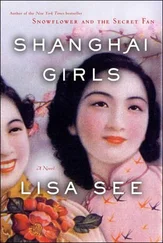Lisa See - Peony in Love
Здесь есть возможность читать онлайн «Lisa See - Peony in Love» весь текст электронной книги совершенно бесплатно (целиком полную версию без сокращений). В некоторых случаях можно слушать аудио, скачать через торрент в формате fb2 и присутствует краткое содержание. Жанр: Старинная литература, на английском языке. Описание произведения, (предисловие) а так же отзывы посетителей доступны на портале библиотеки ЛибКат.
- Название:Peony in Love
- Автор:
- Жанр:
- Год:неизвестен
- ISBN:нет данных
- Рейтинг книги:4 / 5. Голосов: 1
-
Избранное:Добавить в избранное
- Отзывы:
-
Ваша оценка:
- 80
- 1
- 2
- 3
- 4
- 5
Peony in Love: краткое содержание, описание и аннотация
Предлагаем к чтению аннотацию, описание, краткое содержание или предисловие (зависит от того, что написал сам автор книги «Peony in Love»). Если вы не нашли необходимую информацию о книге — напишите в комментариях, мы постараемся отыскать её.
Peony in Love — читать онлайн бесплатно полную книгу (весь текст) целиком
Ниже представлен текст книги, разбитый по страницам. Система сохранения места последней прочитанной страницы, позволяет с удобством читать онлайн бесплатно книгу «Peony in Love», без необходимости каждый раз заново искать на чём Вы остановились. Поставьте закладку, и сможете в любой момент перейти на страницу, на которой закончили чтение.
Интервал:
Закладка:
There was very little in the final third of the opera that I liked. It was mostly about the world beyond Liniang’s garden—with great battle scenes, where everyone was on the move—but it completely captivated the audience on my side of the screen. Around me the women sank deeper into the story. I waited until I couldn’t stand it any longer; then, with my heart pounding, I slowly rose, smoothed my skirts, and walked back as casually as possible toward the women’s chambers.
But I didn’t go to the Unmarried Girls’ Hall. I turned off the main path and then hurried along the south wall of our property, past small ponds and viewing pavilions, until I reached the trail by the lakeshore. I had never been on this path before and was unsure how to proceed. Then I saw the Moon-Viewing Pavilion and sensed my stranger there already.
Only the quarter moon illuminated the night, and I searched the darkness until I found him. He perched on the balustrade that lined the farthest edge of the pavilion, looking not out at the water but at me. My chest constricted with that knowledge. The path had been inlaid with pebbles in designs that created bats for happiness, tortoise backs for longevity, and cash for prosperity. Each step thus brought joy, a long life, and more wealth.
My ancestors had also constructed these pathways for health reasons. As ( 5 5 )
they aged, the pebbles massaged their feet as they walked. This must have been in long-ago days when women weren’t allowed in the garden, because I found the surface hard to walk on with my bound feet. I focused on making each foot find purchase on a pebble, balancing just so before committing myself to moving forward, knowing that this accentuated the delicacy of my lily walk.
I hesitated before stepping into the Moon-Viewing Pavilion. My courage faded. This place had always been forbidden to me because three sides were surrounded by water. Technically, it was outside our garden walls. Then I remembered Liniang’s determination. I took a breath, walked into the middle of the pavilion, and stopped. He wore a long gown of midnight-blue silk. Next to him on the balustrade were a peony and a sprig of willow. He didn’t stand. He just stared at me. I tried to keep perfectly still.
“I see you have a three-ways viewing pavilion,” he said. “I have the same in my home, only ours is on our pond and not the lake.”
He must have seen my confusion, so he explained. “From here you can see the moon three ways: in the sky, reflected in the water, and refracted from the lake into the mirror.” He lifted his hand and languorously pointed to a mirror that hung above the only piece of furniture in the pavilion: a carved wooden bed.
“Oh!” slipped from my mouth. Until this instant I had never considered a bed in a pavilion as anything other than a place for the lazy to rest, but now I trembled at the thought of the bed, the mirror, and the languid nights I wished I could have in his moon-viewing pavilion.
He smiled. Had he found humor in my embarrassment or were his thoughts the same as mine? After a long and to me discomforting moment, he rose and came to my side. “Come. Let’s look out together.”
When we reached the balustrade, I gripped a pillar to steady myself.
“It’s a beautiful night,” he said, looking out across the glassy water.
Then he turned to me. “But you are far more beautiful.”
I felt overwhelming happiness and then a horrible wave of shame and fear.
He stared questioningly into my face. “What’s wrong?”
Tears welled in my eyes, but I forced myself to contain them. “Perhaps you see only what you want to see.”
“I see a real girl whose tears I want to kiss away.”
Twin drops overflowed and ran down my cheeks.
( 5 6 )
“How can I be a good wife now?” I gestured around me hopelessly.
“After this?”
“You’ve done nothing wrong.”
But of course I had! I was here, wasn’t I? But I didn’t want to talk about it. I stepped away, folded my hands in front of me, and said in a steady voice, “I always miss notes when I play the zither.”
“I don’t care for the zither.”
“But you won’t be my husband,” I responded. A pained look came over his face. I’d hurt him. “My stitches are too large and ungainly,” I blurted quickly.
“My mother does not sit in the women’s hall all day for needlework. If you were my wife, the two of you would do other things together.”
“My paintings are weak.”
“What do you paint?”
“Flowers—the usual.”
“You are not the usual. You shouldn’t paint the usual. If you could paint anything you wanted, what would you choose?”
No one had asked me that before. In fact, no one had ever asked me anything quite like it. If I had been thinking, if I had been at all proper, I would have answered that I would keep practicing my flowers. But I wasn’t thinking.
“I would paint this: the lake, the moon, the pavilion.”
“A landscape then.”
An actual landscape, not a landscape found hidden in cold slabs of marble like the ones in my father’s library. The idea intrigued me.
“My home across the lake is high on the hill,” he went on. “Every room has a view. If we were married, we’d be companions. We’d go on excursions—on the lake, on the river, to see the tidal bore.”
Everything he said made me happy and sad at the same time as I longed for a life I would never have.
“But you shouldn’t worry,” he continued. “I’m sure your husband isn’t perfect either. Look at me. Since the Song dynasty it has been the ambition of every young man to achieve distinction in official life, but I have not taken the imperial exams and I have no ambition to take them.”
But this was how it was supposed to be! A man today—one who was loyal to the Ming—would always choose an interior life over one of civil service in the new regime. Why had he said that? Did he think I was old-
( 5 7 )
fashioned or just plain stupid? Did he think I wished him to be in business? Making money as a merchant was vulgar and low.
“I’m a poet,” he said.
I grinned. I had intuited it the first moment I saw him through the screen. “The greatest calling of all is to have a literary life.”
“I want a marriage of companions—one of shared lives and shared poems,” he murmured. “If we were husband and wife, we would collect books, read, and drink tea together. As I told you before, I’d want you for what’s in here.”
Again he pointed to my heart, but I felt it in a place far lower in my body.
“So tell me about the opera,” he said after a long moment. “Are you sad not to see Liniang reunite with her mother? I understand that girls love that scene.”
It was true. I did love that scene. As the battles wage on between the brigand and the empire’s forces, Madame Du and Spring Fragrance seek shelter at an inn in Hangzhou. Madame Du is amazed—frightened—to see what she believes is her daughter’s ghost. But of course, by now the three parts of Liniang’s soul have been brought back together and she is a girl once again, of flesh and blood.
“Every girl hopes her mother would recognize her and love her, even if she were dead, even if she were a ghost, even if she eloped,” I said.
“Yes, it is a good qing scene,” my poet agreed. “It shows us mother love.
The other scenes tonight . . .” He jutted his chin indifferently. “Politics don’t interest me. Too much li, don’t you agree? I much prefer the scenes in the garden.”
Was he mocking me?
“Mengmei brought Liniang back to life through passion,” he went on.
“He believed her back into existence.”
Читать дальшеИнтервал:
Закладка:
Похожие книги на «Peony in Love»
Представляем Вашему вниманию похожие книги на «Peony in Love» списком для выбора. Мы отобрали схожую по названию и смыслу литературу в надежде предоставить читателям больше вариантов отыскать новые, интересные, ещё непрочитанные произведения.
Обсуждение, отзывы о книге «Peony in Love» и просто собственные мнения читателей. Оставьте ваши комментарии, напишите, что Вы думаете о произведении, его смысле или главных героях. Укажите что конкретно понравилось, а что нет, и почему Вы так считаете.












